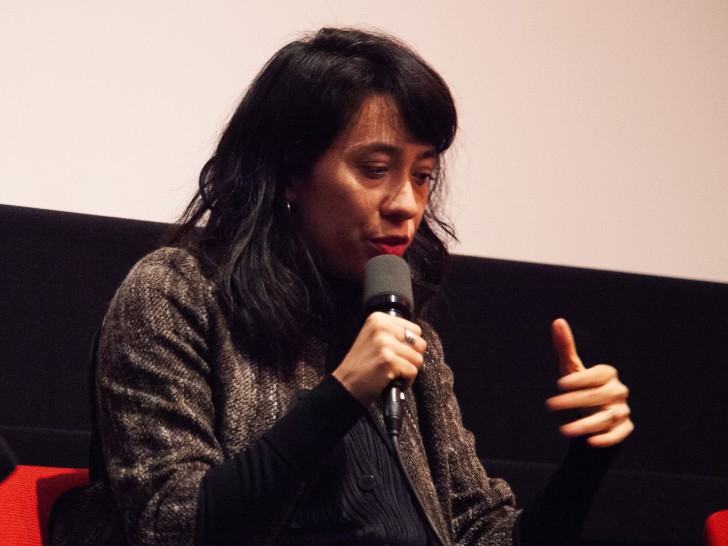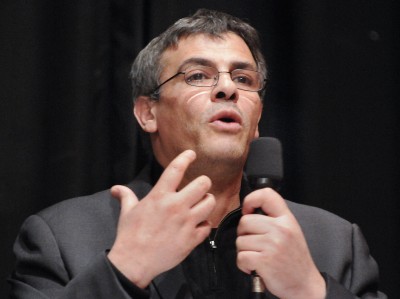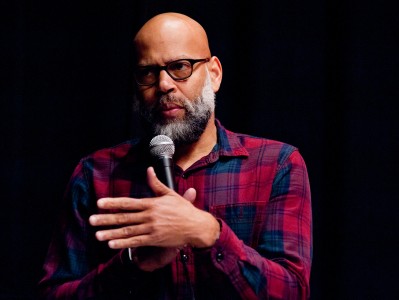
Acts of Seeing, Acts of Freeing introduction and discussion with Haden Guest and Laura Huertas Millan.
Transcript
Haden Guest 0:02
Laura Huertas Millán is no stranger to Harvard. She was, for a number of years, a member of the community gathered and working within the Sensory Ethnography Lab. And it was here, in fact, that she made some of her, I think, to date, most exciting films, some of which we will be seeing tonight and tomorrow. Films that hover gently between fiction and nonfiction, films who speak to a larger history, a deeper history, and problematize that history of ethnographic cinema in really subtle and sublime ways. But this is the first time that Laura Huertas Millán is presenting films here at the Harvard Film Archive, and so we're really thrilled and honored to celebrate this occasion. And we begin first with a program which was curated by Laura Huertas Millán herself. While it does include one of her latest films, El Laberinto, The Labyrinth, it also includes a number of works from different artists, including Chick Strand, we'll be seeing a beautiful 16 millimeter print of Artificial Paradise, as well as artists such as Cauleen Smith, we have a film as well by Tracey Moffatt. And so it's a really diverse program, and yet, organized around a certain, a number of throughlines, which Laura will offer some words about now. We'll be joined tomorrow night by Laura Huertas Millán, together with Cecilia Barrionuevo, who is the Director of the Mar del Plata Film Festival. And we're really lucky to have her here. She's actually in the audience tonight, so let's give her a little welcome.
[APPLAUSE]
Haden Guest 2:02
So that's gonna be an exciting conversation. And that's gonna follow a screening of three very recent films by Laura Huertas Millán. So please come back for that. I'd like to ask you to please turn off any cell phones, any electronic devices that you have. Please refrain from using them. We'll just have some introductory remarks tonight. There won't be a Q&A. But that'll come, as I said, tomorrow night. And I should also thank the Film Study Center. We partnered with them on this program and Laura Huertas Millán’s visit. And I want to thank Lucien Castaing-Taylor, Cozette Russell, and, as well as Julie Mallozzi, at the Film Study Center, for their support and friendship. And now, with no further ado, please join me in welcoming Laura Huertas Millán.
[APPLAUSE]
Laura Huertas Millán 3:00
Good night. Thank you so much, Haden, for this invitation. I'm deeply honored to be here tonight. A few years ago, I was a student here. So it means a lot to be showing my works here. So, we are very lucky to see this program in such good conditions. Many of the films we will see on film prints, two in 35 millimeter and two in 16 millimeter. And I wanted to say a few words about the program, just to give a little bit of context of how I imagined it. So, when Haden proposed me to build a program around the idea of the ethno-fiction, which is this notion, or concept, coined by Jean Rouch, I thought about it. How could I play with this term? Of course, based on my own research, which has been going on for about, I would say, almost 10 years now. And how could I play with this term in a way that could shift, a little bit, the demonic narratives about ethnography, and around ethno-fictions, and perhaps, to play a little bit with a constellation of works, which are very, I would say, looked a lot from one single perspective, which is, a lot of time, man going to faraway places and looking at supposed “otherness.” So how could I play with this, and perhaps propose different points of view, points of view that are closer, perhaps, to my practice, and to the questions that I try to raise in my films. And some of the films that we are going to see tonight were made by women who worked far away from any institutional recognition for a long time, and who, even if they didn't find an audience right away, they kept on working, and with a very fierce work. So I hope that these films will inspire you tonight. And you will feel how brave many of them, I mean, how much courage it took to some of these women to produce them. Something else that I wanted to, perhaps give you a little bit of context, is the fact that I also wanted to play with the idea of the first contact, which is a sort of myth that has been a lot on ethnography, as if, in some places, people were living out of time, and so somehow waiting for discovery, which is a myth that I have seen a lot in visual anthropology. So I was trying also to play with this notion, and how to see, and I was trying to create present works that play with this idea, and build the sort of reversed ethnography, in a way that it's not another that is been looked at. But it's almost the, I would say, the reversed system of that.
Yes. So I think this is it. And let's say this is an homage to the voices that have, are not being listened enough on visual anthropology academia and spaces, and I'm very grateful to have this space to show these kind of works. Thank you.
[APPLAUSE]
©Harvard Film Archive
Related film series
Explore more conversations
Yoshida Kiju & Okada Mariko

Abdellatif Kechiche

Hong Sangsoo

Kevin Jerome Everson

